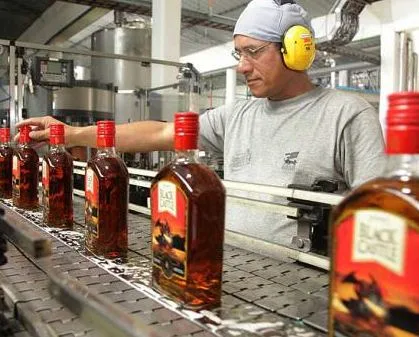Sales of imported liquor soar in 2017 with elimination of taxes and EU trade deal; Cuenca distillers worry
By Liam Higgins
According to Ecuador’s customs service, the value of imported liquor has doubled in 2017 over 2016 with December figures yet to be counted. For European liquor, the increase is more than 400%, year over year.

A worker monitors a whisky production line at Cuenca’s Embotelladora Azuaya (El Comercio)
The reason for the increase is no surprise, says Felipe Cordovez, president of the Ecuador Imported Liquors Association. “The end of the import surcharges and the trade agreement with the European Union (EU) is having a huge impact on the market,” he says. “Two years ago, we were paying a 45% surcharge on liquor and this was in addition to the import fee charged to European producers. Today, the price of a bottle has dropped from $60 to $20 or $25 on some products and this brings new consumers into the market.”
According to the customs service, liquor imports through November totaled $30.16 million compared to $14.35 million in 2017. Cordovez says that December imports could add another $7 million to $8 million to the year’s total.
Even more impressive is the increase of EU imports from $2.5 million in 2016 to $10.54 million through November. “On average, European liquor prices per bottle have dropped 60%,” Cordovez adds, saying he expects strong growth to continue in 2018 despite a new government tax that will add about 5% to the cost of a bottle.
The growth of imports is not all good news for Ecuador’s liquor industry. Distillers in Cuenca, the country’s liquor-making capital, claim that the low prices of imports is hurting their sales.
Jorge Talbot, manager of Embotelladora Azuaya, one of Cuenca’s largest producers, says his company’s sales grew slowly in 2017 and expects 2018 sales to be flat. “We need help to compete with cheaper foreign labels since our costs for raw materials is high,” he says. “We are asking the government to reduce our tax burden to keep the industry healthy.”
Embotelladora Azuaya produces whisky, gin, vodka, rum, and brandy among other products.
An example of the inequity, he says, is the cost of bottles. “Because of their production volume, European companies pay seven cents for a 750 ml bottle while we pay 75 cents,” Talbot says. “We would like to import empty bottles from Europe but we are forced to pay a 15% to 20% tariff. This was overlooked during the trade negotiations and it hurts our competitiveness.”
Importer Eddy Castillo believes the competition between Ecuadorian and foreign labels is good for the consumer. He points to the increased liquor selection at Cuenca Supermaxis. “Buyers have twice as many choices today as they had two years ago, and the choices will continue to grow,” he says.
He adds that he is not unsympathetic to the challenges faced by local producers. “Maybe they need some help in reducing materials costs but, in the end, they will have to adjust their strategy to compete with the imports,” he says. “They have many advantages in the mid-price market since most imports are still more expensive.”




















